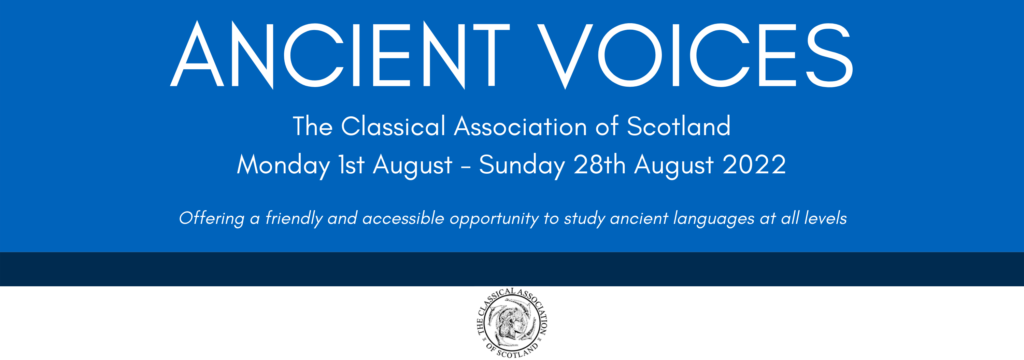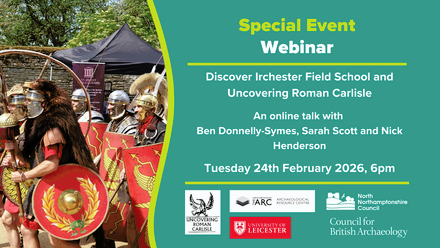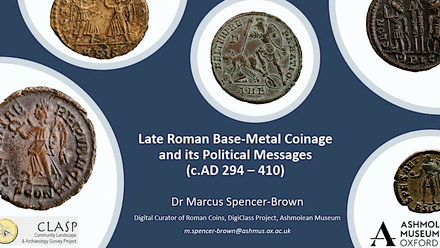Ancient Voices
Ancient Voices

The Classical Association of Scotland is proud to open registration for its summer languages initiative: Ancient Voices.
Following the success of our inaugural online language initiative in 2021, CAS are pleased to announce that we are maintaining our online Summer School, opening sessions which would usually be geographically restricted to a truly global audience, and facilitating learning amongst those who otherwise lack the time or resources to commit to more intensive in-person courses etc.
In 2022, CAS will expand on our timetable from last year, and offer a set of online summer classes in different ancient languages, purposefully designed and shaped to those with already busy schedules, or who simply want to give the subjects a try without a large financial or time commitment. In this way, the classes are perfect for students, teachers and lifelong learners alike! From Monday 1st August until Sunday 28th August, we will be dividing the week into sections where we offer language class in 2hr slots in Latin, Ancient Greek, Aramaic, Hebrew, Sumerian and Egyptian Hieroglyphs. The weekly layout will look like this:
All times are based on UK-time (please Google ‘time in Edinburgh’ if unsure!)
| Monday | Tuesday | Wednesday | Thursday | Friday | Saturday | Sunday |
| Beginners’ Latin Session (12.00-14.00)
& Beginners’ Sumerian (15.00-17.00) |
Intermediate Latin Session (10.00-12.00)
& Advanced Latin Session (15.00-17.00) |
Beginners’ Aramaic (12.00-14.00)
& Optional Lectures/Workshop (15.00-17.00) |
Beginners’ Greek Session (15.00-17.00) |
Intermediate Greek Session (10.00-12.00)
& Advanced Greek Session (15.00-17.00) |
Beginners’ Hieroglyphs Session (12.00-14.00)
& Beginners’ Hebrew |
Drop-In Language Clinic
(15.00-15.30) |
Each individual language stream (e.g. Latin Beginners) is priced at £55 per person. This entitles you to the full 8hrs of language tuition, access to drop-in language clinics for questions and troubleshooting, and access to a variety of optional workshops which will include both linguistic and non-linguistic topics (tbc).
COURSE SYNOPSES
Course synopses are being finalised by our class leaders and will be placed here in due course. Our beginners’ streams will focus on grammar and some vocabulary acquisition, working towards translating short texts in the original language. Intermediate and Advanced streams will be text-based from the outset, honing in on topics of interest and importance as classes work through them together.
Beginners Latin
Beginners Latin provides an introduction to the Latin language, over 4 x 2hr taught sessions, one per week, over 4 weeks, with some independent study expected between sessions. No previous knowledge is required.
We will start with the basic ‘rules’ and fundamentals of structure and vocabulary, which will give students a basic toolkit with which to get started on some straightforward translation. Sessions will be grammar focused, with simple translation exercises tailored around the grammar points taught in each session. Starting with simple sentences, we aim to progress to longer but straightforward passages.
Language learning will be structured around the following main elements: verbs in the first and second conjugations, and the verb ‘to be’, all in the present tense; nouns of the first and second declensions, and agreement of adjectives. This is not exhaustive – depending on progress we can expand on content.
By the end of week 4 our aim is for students to have an understanding of the basics of the language, and to be able to approach basic text with ease and confidence. These sessions are designed to provide a foundation for further study. Learning materials will be provided both in advance of classes and throughout.
Course Leader is Alison Greer
Beginners Greek
Beginners Greek introduces students to Ancient Greek from scratch. Although no previous knowledge of the language is required, it is highly recommended that you get yourself acquainted with the alphabet before the start of the course, for which you will receive some helping material a week before the start of the course.
In four two-hour sessions, we will cover the basics of Ancient Greek morphology and syntax. Some of the topics that you will be introduced to are the case system, first and second declension of nouns and adjectives (time permitting, some third declension nouns as well), verbs in –ω (present, imperfect, future of the indicative), some basic irregular verbs (including the verb εἰμί, i.e. to be), some pronouns, independent clauses. Depending on how much progress we make, we might expand on further topics. Much emphasis will be put on the acquisition of vocabulary as well. Most texts will be tailored for the purposes of the course, but very short original passages from the Gospels, Xenophon’s work, or some inscriptions and papyri may be added as well depending on much we manage to cover in class.
Reading comprehension of short sentences and paragraphs, as well as active interaction with the language will be preferred over translation, although the latter will not be neglected. By the end of the course, you should have a grasp of the fundamentals of Ancient Greek and should be able to understand short basic tailored texts with ease.
Course Leader is Juan Lewis
Intermediate Latin
The Intermediate Latin Course is designed to build on your basic knowledge of Latin and, by the end of it, you should feel (more) comfortable to read and translate short non-adapted Latin texts.
You might be asked to prepare short extracts of texts from various authors (10-12 lines) from both the republican and the imperial period, and classes will focus on the most challenging grammar/syntax topics found there with ad hoc exercises. The topics covered will include, for instance, irregular verbs, comparatives, pronouns, uses of subjunctives for subordinate clauses, ablative absolute, (possibly) gerund and gerundive. The range of topics will be tailored further to the level of the class.
Unseen translations are to be expected, as well as translations from English to Latin, which are most effective in consolidating grammar and making you understand sentence structures in depth.
Pre-requisites:
You should be comfortable with noun and adjective declensions, be able to recognise verb forms of all conjugations in the active and passive indicative. The declension of more challenging pronouns (relatives, for instance) will be revised, as well as the conjugation of subjunctive. A good grasp of the simplest subordinate clauses and constructions is desirable but not strictly necessary as it will be covered in class.
Course Leader is Laura Donati
Intermediate Greek
The Intermediate Greek course is aimed at post-beginners in Greek who have a basic understanding of the Greek language but want to advance their knowledge and consolidate their grammar and reading skills. The course will offer the opportunity to study in depth some complex grammatical phenomena, starting with verb: tense, aspect and mood, and moving on to secondary clauses (temporal, causal, result and purpose clauses, and conditionals). The grammar session will be complemented by readings of non-adapted literary texts, both prose and verse, which offer various representations of women, and illustrate attitudes towards sexuality and gender (marital sexuality, transgression and deviance, prostitutes and courtesans). By the end of the course students will have developed an enhanced understanding of the nuances of the Classical Greek language, and the ability to translate with confidence from Greek into English and read independently.
Text selection (extracts): Xenophon, Cyropaedia; Lysias, On the Murder of Eratosthenes; [Demosthenes], Against Neaira; Euripides, Medea; Aristophanes, Lysistrata; Menander, Dyskolos.
Course Leader is Natalia Tsoumpra
Advanced Latin
Advanced Latin focuses on study of complex sentences in original Latin texts. Thus, good knowledge of Latin grammar and syntax is required. Among the topics covered by the course are embedded clauses (ut, quod, quin), interrogative clauses, adverbial clauses (aim vs result, clauses of fearing, temporal, causal and concessive clauses), conditionals. We might expand on other topics if there’s time left.
Teaching will be based on the analysis of a selection of passages from authors like Cicero, Nepos, Tacitus, Suetonius, Pliny, etc. in which those complex constructions are found. You will be communicated which passages will be discussed in class in advance of each session, giving you enough time them in detail. Discussion of unseen texts from inscriptions or papyri should also be expected.
Emphasis will be put on reading and answering questions on longer paragraphs, and on the critical analysis of the syntax and structure of some particularly complex sentences, as well as on Latin’s similarities and differences with English. When possible, students will be prompted to suggest alternative ways in which the selected authors may have structured some of the sentences analysed.
Course Leader is Juan Lewis
Advanced Greek
The Advanced Greek course will explore a selection of passages from a variety of literary genres: Homeric Hymn to Aphrodite (45-255), Euripides’ Hippolytus (1-120; 267-481); Plato’s Symposium 180-2; Xenophon’s Symposium (Chapter 8).
If time allows, we will also be looking at parts of Homer’s Odyssey 8 (266-366), Hesiod’s Works and Days (109-201) and Apollonius’ Argonautica 3 (1-130).
The passages will offer a glimpse into the varied ways in which the goddess Aphrodite and the repercussions of love were perceived in the ancient Greek world.
The class will primarily focus on translating; a good command of Greek grammar and syntax is thus necessary, but there will be ample opportunities for revision and consolidation of previous knowledge. Complex grammatical and syntactical features will be analysed and revised as they arise while translating. Particular emphasis will be given to syntax, especially on verbal adjectives and all types of subordinate clauses in direct and indirect statement.
In-class exercises and brief unseen passages are also to be expected.
Course Leader is Manos Tsakiris.
Beginners Aramaic
Our Aramaic session will presume some knowledge of Hebrew. It will cover the introductory basics of the language from a comparative perspective and look at its place in the Semitic language family, its writing system, phonology, morphology, some lexicon, and discuss the various texts in view for an “Aramaic corpus broadly conceived.” This includes not only biblical Aramaic, but the broader corpus of historical Aramaic in Old, Imperial, and Middle Aramaic especially.
Course Leader is Nathaniel Greene
Beginners Hebrew
The beginners Hebrew session will be a basic introduction to the building blocks of the language. Most importantly, we will discuss the alefbet, the major ways in which Hebrew is different from many languages attendees may have studied in the past, basic elements of grammar, and a small overview of some resources that will be helpful to beginning students.
Course Leader is Nathaniel Greene
Beginners Hieroglyphs
This brief introduction to hieroglyphic Egyptian is aimed at complete beginners. After an introductory session that will teach the basics of Middle Egyptian, we will move on to read excerpts from texts in three linked sessions that explore Egyptian conceptions of the life after death. We’ll read from a literary text in which a man and his soul argue about the merits of life and death, and we’ll contrast the positive imagery in funerary wishes with the carpe-diem pessimism of the so-called harper’s songs. All texts and supporting materials will be provided.
- Session 1: Introduction to hieroglyphs and basic Middle Egyptian grammar
- Sessions 2-4: Theme – What next? After Life in Ancient Egypt
- Session 2: An existential struggle: Excerpts from The Dispute of a Man with his Soul (Middle Kingdom literary text)
- Session 3: Wishing for the best: Funerary wishes from the tomb of Paheri (New Kingdom)
- Session 4: Going to the dark side: Harper’s Songs
Course Leader is Angela McDonald
Beginners Sumerian
Some know Sumerian as the language of the Anunnaki Gods, others as the world’s first written language. Fascinating and intriguing, it is also the perfect ancient language for beginners! For it abounds in simple so-called ‘building inscriptions’, in which rulers from the 2000s BC record their work on temples and palaces. These use simple language, and one can learn to read them quite quickly.
The course will concentrate on these simple inscriptions, enabling you to read real, authentic Sumerian in a matter of weeks. It will also give you glimpses of the larger world of more complicated writings, such as poetry, and of the problems which beset the understanding of Sumerian at a really detailed level.
Course Leaders are Martin Worthington and Mark Chetwood



